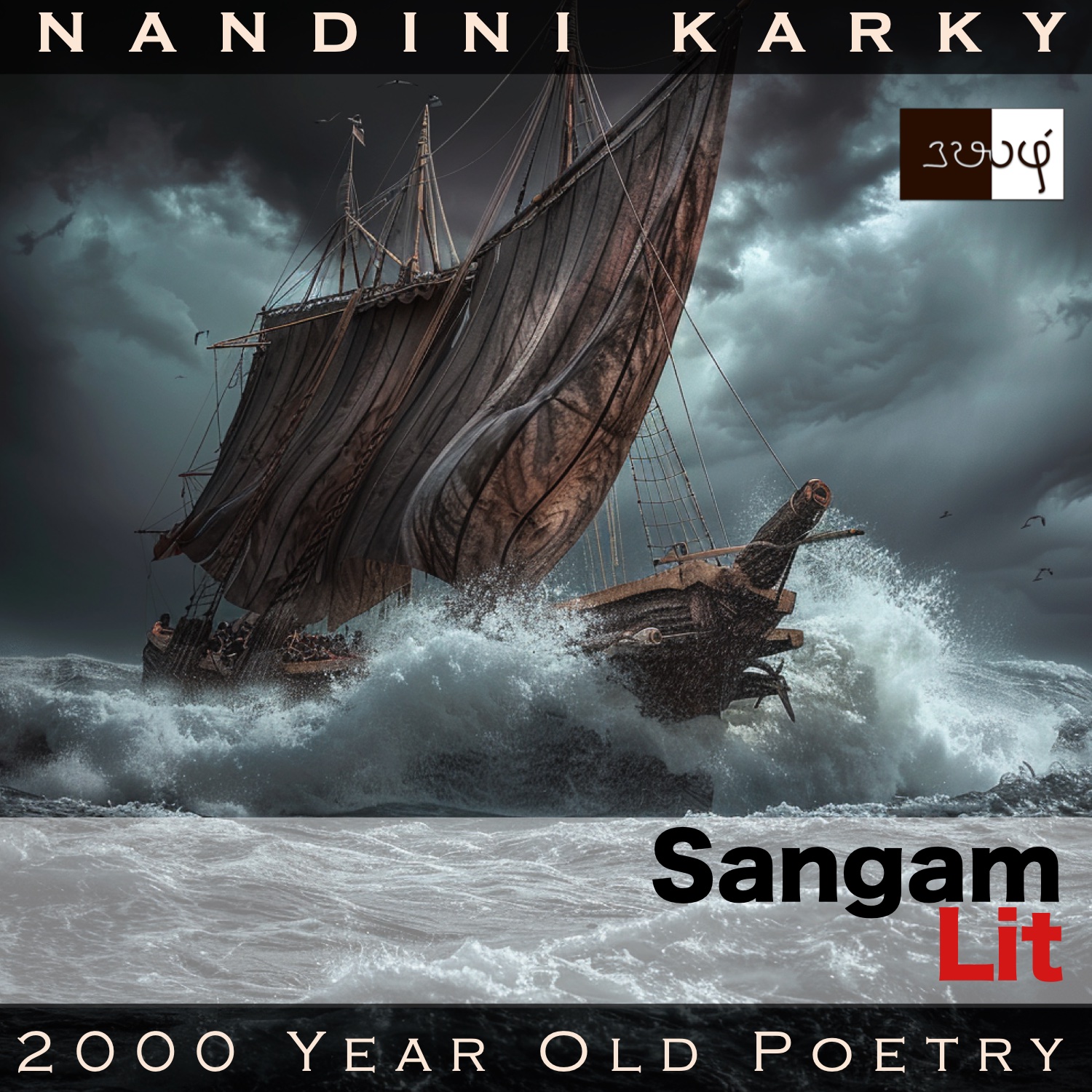Podcast: Play in new window | Download
Subscribe: Apple Podcasts | Spotify | Amazon Music | Android | iHeartRadio | TuneIn | RSS | More
In this episode, we perceive an effort of persuasion, as portrayed in Sangam Literary work, Kalithogai 5, penned by the Chera King Paalai Paadiya Perunkadunko. The verse is situated in the ‘Paalai’ or ‘Drylands landscape’ and narrates the state of the lady if the man were to part away.

பாஅல் அம் செவிப் பணைத் தாள் மா நிரை
மாஅல் யானையொடு மறவர் மயங்கித்
தூறு அதர்பட்ட ஆறு மயங்கு அருஞ் சுரம்
இறந்து, நீர் செய்யும் பொருளினும், யாம் நுமக்குச்
சிறந்தனம் ஆதல் அறிந்தனிர்ஆயின்,
நீள் இரு முந்நீர் வளி கலன் வௌவலின்
ஆள்வினைக்கு அழிந்தோர் போறல் அல்லதை,
கேள் பெருந் தகையோடு எவன் பல மொழிகுவம்?
நாளும் கோள் மீன் தகைத்தலும் தகைமே
கல்லெனக் கவின் பெற்ற விழவு ஆற்றுப்படுத்த பின்,
புல்லென்ற களம் போலப் புலம்பு கொண்டு அமைவாளோ?
ஆள்பவர் கலக்குற அலைபெற்ற நாடு போல்,
பாழ்பட்ட முகத்தோடு, பைதல் கொண்டு அமைவாளோ?
ஓர் இரா வைகலுள், தாமரைப் பொய்கையுள்
நீர் நீத்த மலர் போல, நீ நீப்பின், வாழ்வாளோ?
என ஆங்கு
பொய்ந் நல்கல் புரிந்தனை புறந்தரல் கைவிட்டு,
எந் நாளோ, நெடுந் தகாய்! நீ செல்வது,
அந் நாள் கொண்டு இறக்கும், இவள் அரும் பெறல் உயிரே.
The confidante is at it again, saying ‘Don’t go’ to the man. The verse can be translated as follows:
“Along with huge herds of rutting elephants, having thick legs and prominent ears, highway robbers too rove amidst the bushes, ruining the paths in the muddled drylands. More than the wealth you gain going thither, to make you understand that she is more special, other than being in the state of those whose great efforts are ruined, because their ship in the huge and dark ocean is seized by a storm, what else can I say to convince you, O noble man! Only the omens of the day and the stars should stop you!
Akin to a listless festival ground, where the uproarious and prosperous festivities have ended, lamenting, will she be?
Akin to a country that is disturbed by the very person who rules it, with a ruined face, suffering, will she be?
Akin to a lotus flower in a pond, wherein the water has been drained within a night, if you part, will she live?
And so, after rendering your false graces, if you show your back, let go of her hand and leave one day, O respected lord, on that very day you leave, it too shall part, that precious life of hers!”
Let’s explore the nuances. The verse is situated in the context of a man’s parting from the lady after marriage, wanting to seek wealth. When he informs the confidante of his intention, she replies to him with these words. First, the image of the drylands as a dangerous place is brought forth, where rutting elephants and ruthless robbers roam. They hide in the bushes and seem to make new paths, confusing the travellers who pass that away. The confidante connects this description saying this is where the man wants to go and if he does not realise that much more than the wealth he can attain, the lady is more important to him, she doesn’t know what to say to him other than wallow in that exact state of those seafarers, who have lost all their ware because their ship is caught in a storm. A moment to pause and note this matter-of-fact simile. That the Tamils were an ancient seafaring nation, with trade in the stormy waters of the Arabian sea, Bay of Bengal and Indian ocean, is evident from this observation. We have to understand that this is no ordinary poet but a Chera King, and no doubt he knows about the trade and commerce of his land. It’s unique how this facet of outer life is used to reflect the inner emotions in a domestic sphere.
Returning, we find the confidante putting her trust in omens of the day and the position of the stars to stop the man from going on his journey. She also wonders what will happen to the lady if the man continued to be intent on leaving, and brings forth three distinctive similes to portray the lady’s state. One, is a festival ground where the fun and celebration is done; Two, a country disturbed by its own ruler; Three, a lotus flower in a pond whose water has been drained overnight. Each of these three ruined states echo the lamenting, suffering state of the lady, the confidante tells the man, if he were to leave. She ends with the final punch that if the man were to leave one day, in spite of all these words she has rendered, then that will be the day the lady’s life parts away too.
What a threat the confidante makes to the man! We cannot help but observe how the lady has been projected as a frail creature who has no way of bearing the man’s separation. Perhaps this was only to showcase the deep love of the lady for her man in the Sangam era. Still, seeing with our modern eyes, it’s a fact of life that a woman should bear the separation of her man for the sake of work and vice versa. What’s interesting and timeless though in this verse is the depiction of scenes in the world to show what is seen by the heart!




Share your thoughts...